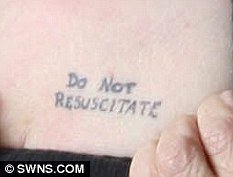Jurisdictions vary as to the validity of advance care directives; some require that a representative be designated in the directive. I presume your parent has completed all the legal documentation. As newtoseattle says, the devil is in the details. If someone dies in hospital, or at home in palliative care, the care providers will be prepared. If someone has an emergency at home, and the emergency services are called, they will not be privy to that information and will be obliged to provide emergency care. The situation will be clarified later. I know of one case where a physician called 911 when her mother had a cardiac arrest at home, and was very upset when the paramedics administered CPR. I don't know what else they could have done. If everyone was clear that no CPR was to be administered, she should not have called 911. Rather, she should have called the family doctor, who could certify the death.
I think the rules of thumb are:
1. Make your wishes clear in writing, using whetever documentation will be recognized where you live;
2. Tell your loved ones what you want. Provide a copy of the document to your physician, your lawyer, and your close family members.
3. Post a memo about your advance directive on your fridge (will not stick to a stainless steel fridge!) or on a kitchen bulletin board, where paramedics can find it.
4. Consider getting an advance directive bracelet from a site like this one:
DNR: Do Not Resuscitate Guidelines

